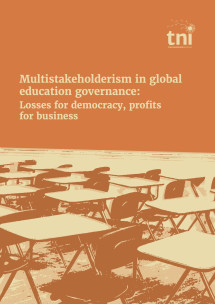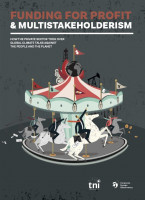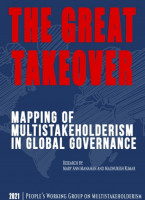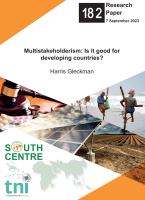Multistakeholderism in global education governance Losses for democracy, profits for business
Temas
This report discusses multistakeholderism in the context of the broader global education governance landscape. The report examines some of the unresolved questions about the democratic implications of multistakeholderism in the education sector by analysing three recent education initiatives. It analyses the extent to which they incorporate multistakeholder principles and practices, and explores how they either reinforce or add further complexity to the global rise of the privatisation of education.

Descargas
Autores
Introduction
In the context of multiple crises and the democratic deficit in the international arena, multistakeholderism has emerged as an alternative form of global governance, in particular as a way to address current challenges to democracies. Growing research, however, shows that it has not lived up to its promise.
This report contributes to the growing global concern about the risks to the right to education represented by the rapid increase in private actors in public education policy. It examines some of the unresolved questions about the democratic implications of multistakeholderism in the education sector by analysing three recent education initiatives. It analyses the extent to which they incorporate multistakeholder principles and practices, and explores how they either reinforce or addfurther complexity to the global rise of the privatisation of education.
The term ‘multistakeholderism’ has been used in various contexts, but generally refers to a governance model in which multiple stakeholders – such as governments, businesses, civil society organisations (CSOs), and individuals – are involved in decision-making processes related to a particular issue or policy. It implies an institutional arrangement that could replace the central roles and responsibilities of nation-states in global governance, as manifested in multilateralism. It remains unclear how it will comply with or enhance global democracy or equity in participation, despite its assumption that involving different groups in setting a policy agenda will lead to better decisions that take into account the needs and interests of everyone involved (Gleckman, 2018).
Although education has been less dominated by multistakeholderism than other sectors, we consider it crucial to study three forms of the education global governance architecture. We refer to these as hybrid initiatives, given their relevance in influencing the education policy agenda at the global and national levels; and that, taken together, they make it possible to analyse the current picture of multistakeholder arrangements in education, illustrating their shortcomings and democratic deficits. The three cases are: (1) SDG-Education 2030 High-Level Steering Committee (HLSC); (2) Global Partnership for Education (GPE); and (3) Global Education Forum (GEF). The report builds on the findings of previous research, especially those presented in The Great Takeover (Manahan and Kumar, 2021), and points to other multistakeholder initiatives and issues in this sector, as well as further research areas to be explored.
The report focuses in particular on the multiple connections to the privatisation of education. In recent decades, the growing participation of private actors in making education policy has challenged traditional understandings of who should be involved in setting educational agendas and making decisions about schooling and education(Verger et al., 2016). At the global and local levels, various globally mobile actors, such as edu-businesses, non-profit organisations, and individual policy entrepreneurs, have been active in shaping education policy (McKenzie and Aikens, 2021). The role played by international organisations with diverse mandates in shaping education policy has become a relevant expression of its privatisation (Ball, 2012; Croso and Magalhães, 2016; Silva and Oliveira, 2022; Verger, Fontdevila, and Zancajo, 2016; Adrião, 2018). In the transnational policy-making context, several actors and spaces are emerging in the negotiations regarding education policy.
Multistakeholderism is one such phenomenon, which is not in isolation from the rise of the participation of private actors in education, nor is it outside the framework of neoliberalism as an economic and political ideology that emphasises individual responsibility and competition, and downplays the role of government in providing public goods and services, such as education(Harvey, 2011). This ideological shift has contributed to an environment in which companies and other private actors, including individuals, are increasingly seen as more legitimate players in setting educational agendas.
This report is organised in four sections. Following this introduction, the second section presents a brief history of the seminal moments and evolution of multistakeholderism, and an overview of its role in the education sector. The third section offers an in-depth analysis of the three cases, in order to illustrate the problematic issues that multistakeholderism presents. Part four concludes and outlines issues for further research.
The report is based on documentary analysis and the researchers’ involvement in multistakeholder initiatives (MSIs), which is seen as a form of praxis (Freire, 1984, 2005). The analysis was also subjected to independent academic appraisal through ongoing critical discussion to avoid the risk of bias.


